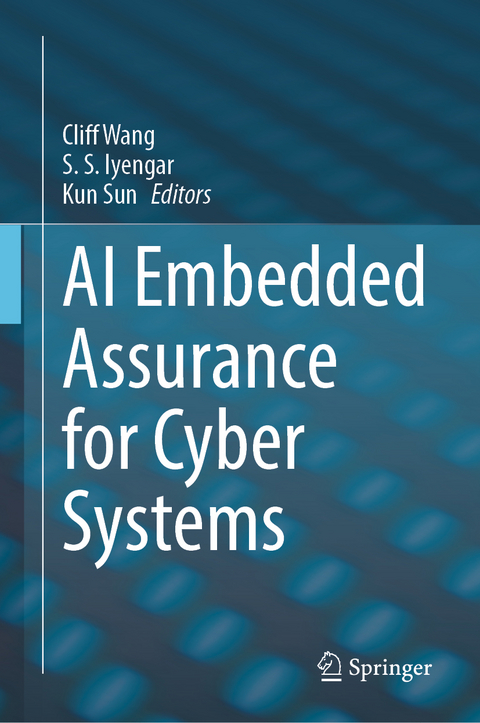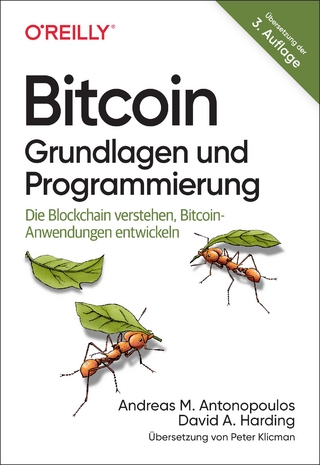
AI Embedded Assurance for Cyber Systems
Springer International Publishing (Verlag)
978-3-031-42636-0 (ISBN)
The rapid growth and reliance on cyber systems have permeated our society, government, and military which is demonstrated in this book. The authors discuss how AI-powered cyber systems are designed to protect against cyber threats and ensure the security and reliability of digital systems using artificial intelligence (AI) technologies. As AI becomes more integrated into various aspects of our lives, the need for reliable and trustworthy AI systems becomes increasingly important. This book is an introduction to all of the above-mentioned areas in the context of AI Embedded Assurance for Cyber Systems.
This book has three themes. First, the AI/ML for digital forensics theme focuses on developing AI and ML powered forensic tools, techniques, software, and hardware. Second, the AI/ML for cyber physical system theme describes that AI/ML plays an enabling role to boost the development of cyber physical systems (CPS), especially in strengthening the security and privacy ofCPS. Third, the AI/ML for cyber analysis theme focuses on using AI/ML to analyze tons of data in a timely manner and identify many complex threat patterns.
This book is designed for undergraduates, graduate students in computer science and researchers in an interdisciplinary area of cyber forensics and AI embedded security applications. It is also useful for practitioners who would like to adopt AIs to solve cyber security problems.
lt;b>Dr. Cliff Wang graduated from NCSU with a PhD in computer engineering in 1996. He has been carrying out research in the area of computer vision, medical imaging, high speed networks, and most recently information security. Dr. Wang currently serves as the program director at National Science Foundation. He is a fellow of IEEE and AAAS.Dr. S.S. Iyengar is currently the Distinguished University Professor, Founding Director of the Discovery Lab and Director of the US Army funded Center of Excellence in Digital Forensics at Florida International University, Miami. He is also the Distinguished Chaired Professor (Hon.) at National Forensics Sciences University, Gandhinagar, India. He has been involved with research and education in high-performance intelligent systems, data science and machine learning algorithms, sensor fusion, data mining, and intelligent systems. Since receiving his Ph.D. degree in 1974 from MSU, USA, he has directed over 65 Ph.D. students, 100 Master's students, and many undergraduate students who are now faculty at major universities worldwide or scientists or engineers at national labs/industries around the world. He has published more than 900 research papers and has authored/co-authored and edited 32 books. His books are published by MIT Press, John Wiley and Sons, CRC Press, Prentice Hall, Springer Verlag, IEEE Computer Society Press, etc. More recently in Spring 2021, Dr. Iyengar was awarded $2.25 M in funding for setting up a Digital Forensics Center of Excellence over a period of 5 years (2021-2026). His path-breaking discovery known as Brooks-Iyengar algorithm discovered in 1996 is a milestone in his career. This discovery has led to a breakthrough in the use of sensors in various applications across the globe. By adopting this algorithm, it was possible to use a network of sensors that would give out precise outputs, though few of the sensors receive wrong inputs or faulty sensors. This algorithm is relevant even today and has received the prestigious "Test of Time" award for its contribution over the decade by IEEE Congress in the year 2019.Dr. Iyengar has received IEEE Fellow award, ACM Fellow, AAAS Fellow, Fellow of Artificial Intelligence AAIA, Fellow, National Academy of Inventors (NAI), Fellow of Institution of Engineers (India) among many awards he has received in his career. He also received IEEE Technical Achievement Award in 1998. Dr. Iyengar is awarded the Lifetime achievement award by International Society of Agile Manufacturing at IIT (BHU) in 2012. He received the Lifetime Achievement award from IEEE High Performance Computing in 2019. Dr. Iyengar was also a Fulbright Distinguished Scholar and has received several honorary PhDs from around the world.He has been awarded the Lifetime Achievement Award for his contribution to the field of Digital Forensics on November 8, 2022, during the 7th INTERPOL DIGITAL FORENSICS EXPERT GROUP (DFEG) MEETING at National Forensics Sciences University, Gandhinagar, Gujarat, India.Dr. Kun Sun is a Professor in the Department of Information Sciences and Technology at George Mason University. He is also the Associate Director of the Center for Secure Information Systems (CSIS) and the Director of Sun Security Laboratory. He received his Ph.D. in Computer Science from North Carolina State University. His research focuses on systems and network security. Dr. Sun has more than 15 years of working experience in both industry and academia, publishing over 120 conference and journal papers, and two papers won the Best Paper Award. His current research focuses on software security, network security, trustworthy computing, moving target defense, AI security, and cloud security. He won the Presidential Award for Faculty Excellence in Research from George Mason University in 2022.
Part. I. AI/ML for Digital Forensics.- Chapter. 1. Writer-dependent Off-line Signature Verification with Neural Networks.- Chapter. 2. Political Activism and Technology.- Chapter. 3. Forensic Proof and Criminal Liability for Development, Distribution and Use of Artificial Intelligence.- Part. II. AI/ML for CPS.- Chapter. 4. Automotive Batteries as Anomaly Detectors.- Chapter. 5. Zero Trust Architecture For Cyber-Physical Power System Security Based on Machine Learning.- Chapter. 6. AI-enabled Real-time Sensor Attack Detection for Cyber-physical Systems.- Part. III. AI/ML for Cyber Analysis.- Chapter. 7. Generating Vulnerable Code via Learning-Based Program Transformation.- Chapter. 8. Security and Privacy Problems in Self-Supervised Learning.- Chapter. 9. Federated Learning for IoT Applications, Attacks and Defense Methods.- Chapter. 10. AI Powered Correlation Technique to Detect VirtualMachine Attacks in Private Cloud Environment.- Chapter. 11. Detecting Fake Users in Online Social Networks.- Chapter. 12. Explaining Deep Learning based Security Applications.- Glossary.- Index.
| Erscheinungsdatum | 14.12.2023 |
|---|---|
| Zusatzinfo | XVII, 246 p. 91 illus., 73 illus. in color. |
| Verlagsort | Cham |
| Sprache | englisch |
| Maße | 155 x 235 mm |
| Gewicht | 553 g |
| Themenwelt | Informatik ► Netzwerke ► Sicherheit / Firewall |
| Informatik ► Theorie / Studium ► Künstliche Intelligenz / Robotik | |
| Technik | |
| Schlagworte | Artificial Intelligence • Cyber analysis • Cyber Physics Systems • cyber security • Deep learning • digital forensics • federated learning • gated recurrent unit • Generative Adversarial Network • graph neural networks • information assurance • internet of things • intrusion detection system • machine learning • Natural Language Processing |
| ISBN-10 | 3-031-42636-3 / 3031426363 |
| ISBN-13 | 978-3-031-42636-0 / 9783031426360 |
| Zustand | Neuware |
| Informationen gemäß Produktsicherheitsverordnung (GPSR) | |
| Haben Sie eine Frage zum Produkt? |
aus dem Bereich


